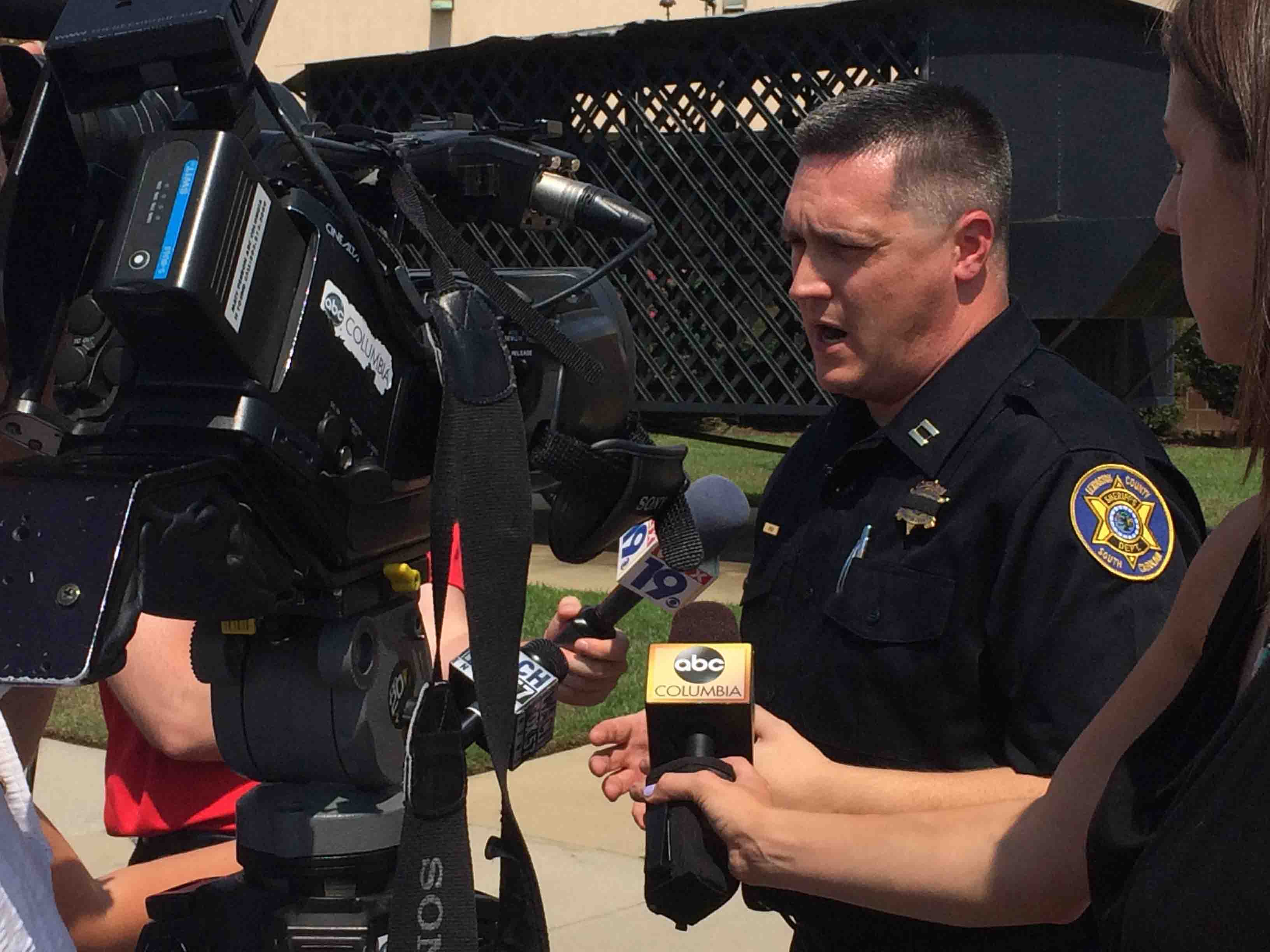Want to know a secret? Members of the media and the government employees who work with them typically have a good relationship.

Reporters interview Capt. Adam Myrick, public information officer for the Lexington County Sheriff's Department. Photo: Colby Gallagher, LCSD.
That was one insight that came out of a panel discussion by veteran reporter John Monk, who writes for The State newspaper; Lexington County Sheriff's Office Public Information Officer Adam Myrick; and City of North Charleston Public Relations Director Ryan Johnson.
About that 'no comment'
Just don't do it.
Johnson said it's appropriate to take the reporter's question and tell him you'll get back to him with an answer as soon as you can.
"When the TV camera is staring you in the face, what's going to make it on TV is going be a 30-second or 15-second clip," said Johnson. "I guarantee they're not to going air the piece where you say, 'We'll get back to you later.'"
He called the "no comment" issue "a false elephant in the room," and that he's never felt the need to say it.
"If you're the one who's designated to talk to reporters, you're usually the most knowledgeable one," he said. "And you do have the information, and you do have comments."
Myrick advised against even uttering the words "no comment," since they might lead a reporter to think an agency is hiding something. He suggested going beyond "no comment" to avoid even saying the word "comment." He said it's best to try to be transparent. But if the topic of press inquiries is one that pertains to a lawsuit, for example, he said it's better for an agency spokesperson to simply say the agency's practice is not to "discuss" pending litigation, if that's the case.
As for Monk, he also saw no useful purpose in the words "no comment."
"You can serve yourself better in a lot of unfolding situations like crises, fires or hostages, by saying 'We've got an evolving situation here,'" said Monk.
"And then you say anything that can help the public because you're not just speaking to a reporter. You're speaking to 10,000 people or 100,000 people, or as in Houston (where catastrophic flooding occurred in August due to Hurricane Harvey), maybe millions of people. So you say, 'We've got an evolving situation, and what can help the public is this: They should stay away from the northern part of Houston. It's all under water.' Anything nuts and bolts you can say."
As for reporters who call an agency seeking a comment on a lawsuit the agency is facing, Monk said the media has an obligation to make contact if they are publishing an article about it.
How to choose a spokesperson
A poor agency spokesperson can miss an opportunity to get critical information to the public. The wrong person fielding press inquiries can also create a debacle that fuels the public's fears and unrest — sometimes even distracting from the event or topic with his own unprofessionalism.
When a spokesperson is poorly trained, the facts of the situation can become murky, the agency's control of events can slip, and the agency's image in the public's opinion can suffer.
"Get someone who can fully be that spokesperson for the duration of the event," said Myrick. "That spokesperson should be very much involved in everything that's developing in terms of the event."
He said the spokesperson should be included in executive-level meetings to stay fully abreast of developments.
"They can't be just briefed 15 minutes before they are to go out and step in front of the cameras or step in front of their own camera for purposes of a social media video that you're producing," said Myrick. "The chief is going to have to be the chief throughout the event," he added. "Other members of the leadership team, they're going to have to be doing what they do."
About that relationship
Myrick and Johnson both noted that increasingly it is young people who are filling the ranks of the news media, especially in TV stations.
He said 20 years ago, a TV reporter would work up to a job in the Columbia media market as the reporter's third or fourth job.
"Now it's stop 1," said Myrick. "People are being hired right out of college."
That means an agency may develop a relationship with a reporter that ends after only two years, when the reporter moves away for a new job. Johnson recommended that government officials who work with the media should form a trusting relationship with a TV station's assignment editor, who, in contrast to a reporter, may stay in the post for years and will have greater editorial authority to determine which segments air.
What if … ?
Suppose there is an accident. A garbage truck strikes a child. What do you do if a TV station crew arrives at the scene and puts the garbage truck driver on camera, ambushing the driver in an interview?
"A good reporter is going to try to talk to anybody," said Monk.
"But a good reporter will also know the garbage truck driver is not going be the sole source of the story. … Theoretically, a responsible reporter will go talk to more people and go to the officials and then put it all together. I'm very careful with what people tell me."
The panel discussion was part of Risk Management Services' Crisis Communications Workshop, held last fall in Columbia. More than 130 officials from RMS member cities attended. For more information and to learn about upcoming RMS training, contact Venyke Harley at vharley@masc.sc or 803.933.1210.
